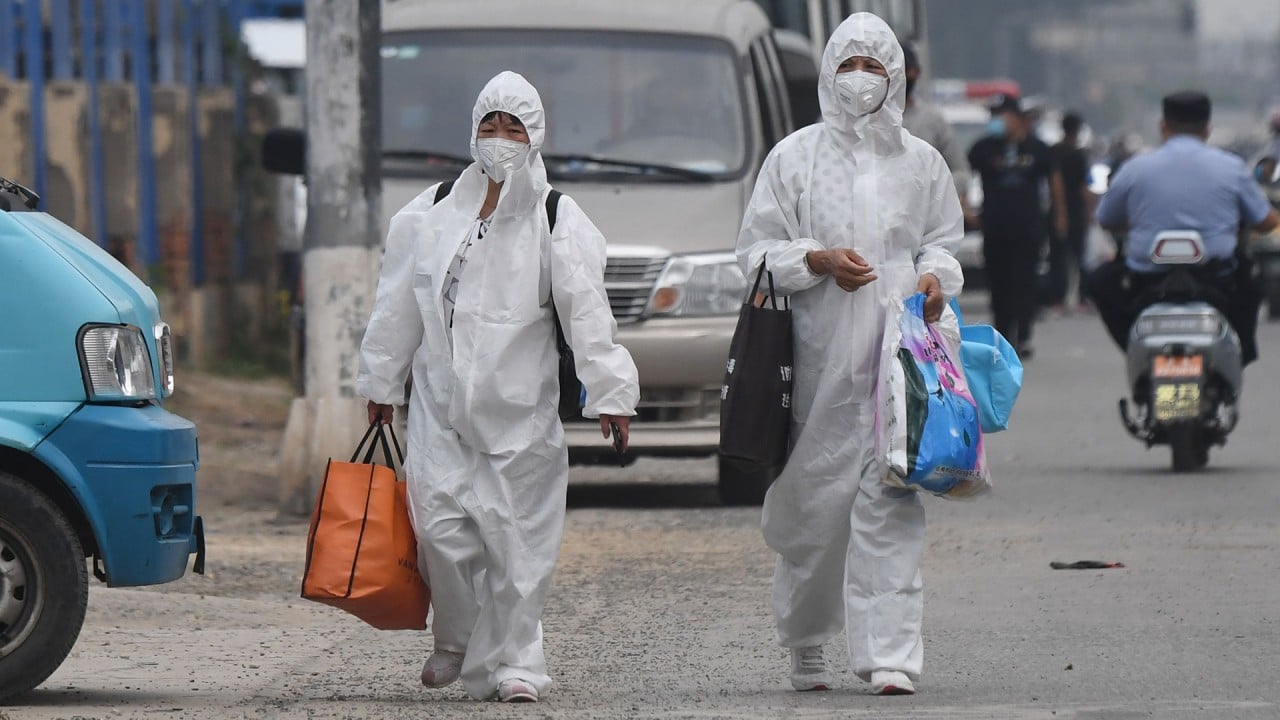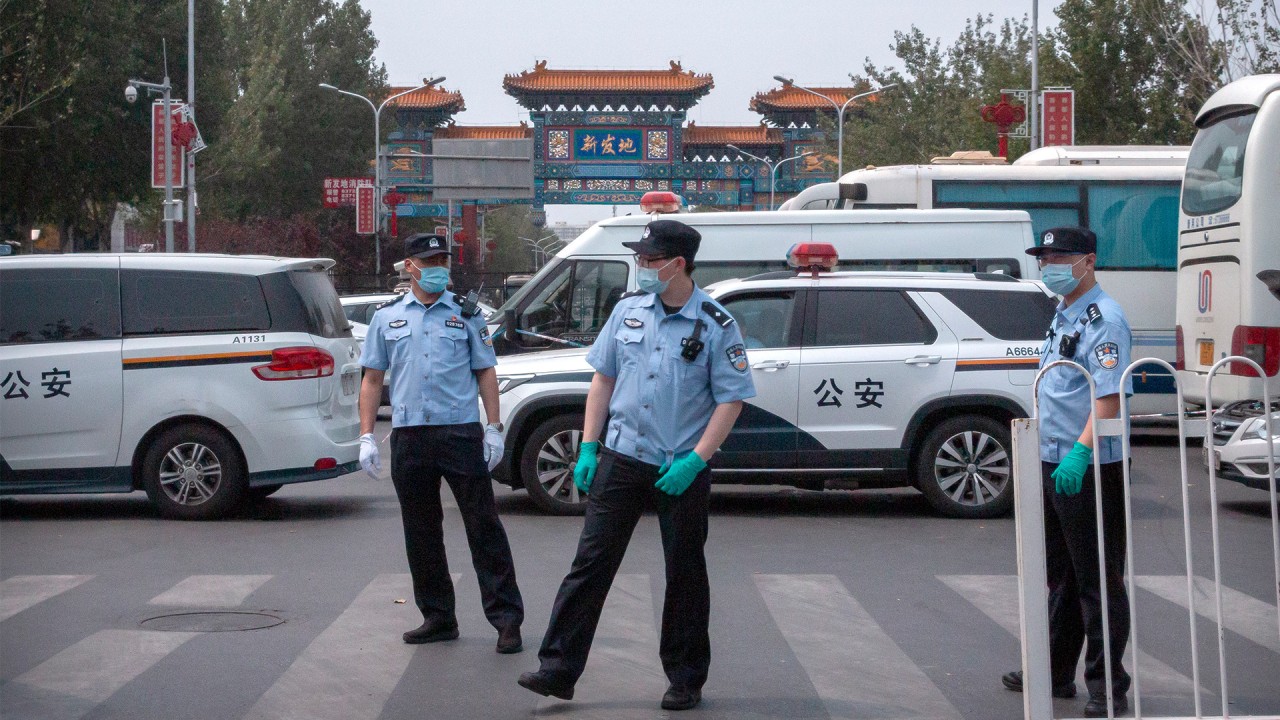
Coronavirus: China halts salmon imports over possible link to Beijing outbreak as consumers leap to conclusions
- Some restaurants drop salmon from menu while others reel from the impact on their business as public exercise caution
- But link to infections at Xinfadi market is only a hypothesis, experts say, while Hong Kong’s imported salmon tests negative for coronavirus
State-run newspapers reported that the virus was discovered on chopping boards used for imported salmon at Beijing’s Xinfadi market, at the centre of a cluster of infections that has sparked fears of a second wave of the pandemic in China.
The reports prompted major supermarkets in Beijing to remove salmon from their shelves.
“We can’t send any salmon to China now, the market is closed,” Regin Jacobsen, chief executive of Oslo-based salmon supplier Bakkafrost, told Reuters.

01:39
New coronavirus outbreak at Beijing food market fuels fears of second wave of cases in China
“We have stopped all sales to China and are waiting for the situation to be clarified,” said Stein Martinsen, head of sales and marketing at Norway Royal Salmon.
Genetic traces of the virus from the Beijing market outbreak suggested it could have come from Europe.
Keith Neal, an emeritus professor of the epidemiology of infectious diseases at Britain’s University of Nottingham, said any link to salmon was probably the result of cross-contamination.
“Markets can be crowded places, so, like in Wuhan, [they] help fuel the spread,” he said. The central Chinese city of Wuhan was where the virus was first reported in late December.
Marion Koopmans, head of the viroscience department at the Erasmus University Medical Centre in Rotterdam, said that with limited data it was difficult to know whether the specific genetic sequence detected in cases from the Beijing market could indeed be linked to Europe.
“There’s mention of a European sequence, but it’s hard to say that with certainty unless there’s a lot of other data on virus diversity in China,” Koopmans said.
“It’s hard for me to understand what they mean by a European strain. What we have seen with the global spread of the virus is that it is diversifying because it gets introduced to different areas and continues to circulate, so you see a signature that looks like this is now a ‘European virus’, but that same signature may also be circulating in Asia – we don’t know.”
Wuhan confirms China’s ban on trade, eating of wild animals
Speaking at a press briefing on Monday, Mike Ryan, head of the World Health Organisation’s emergency programme, said he “fully expects” China to publish the genetic sequencing of the virus when it is ready.
“The finding that this may represent a strain more common in transmission in Europe is important and it may reflect human-to-human transmission more than any other hypotheses,” he was quoted by Reuters as saying.
Ryan also said the claim that the new infections in Beijing may have been caused by importing or packaging of salmon was just a “hypothesis”.
The possible link to salmon has already caused panic among consumers and prompted some restaurants to remove it from their menu. Wei Wei, an executive at a high-end Japanese restaurant in Beijing’s Chaoyang district, said her group had done so and felt the impact immediately.
“All the reservations were cancelled and our revenue was down to almost zero,” Wei said.
She said her restaurant had absorbed the coronavirus’ initial impact and business had picked up again, but she was very pessimistic about the latest outbreak.
Wet markets: a way of life for many Chinese shoppers
“It was a direct hit to Japanese restaurants,” she said. “People are avoiding fresh seafood this time, not only salmon, and we are suffering.”
A member of staff who answered the phone at the Sanyuanli Market in Beijing, a wet market frequented by foreigners, said salmon was still available in the market because it was not sourced from Xinfadi, but sales of it had been poor and there were significantly fewer customers at the market at the weekend.

02:17
Beijing district in ‘wartime emergency mode’ after spike in local Covid-19 cases
Liu Mengyao, a university employee in Beijing, was worried, having eaten a salmon salad at a Japanese restaurant days before the new infections were reported.
“I’m not going to eat salmon any more, I won’t take the risk,” she said.
Beijing Covid-19 outbreak puts food markets back in infection focus
Chen Feifei, a video producer who lives 7km from Xinfadi, also said she would not risk eating salmon. Her residential compound had restricted access and temperatures were being taken at the gates.
In Shanghai, the same worries were evident. Taniguchi Yoshitada, owner of the Japanese restaurant Makino, said there had been a drop in customers.
“I’ve seldom served salmon in recent days,” he said. “Most people avoided raw fish.”
The manager of a small Japanese restaurant with the Chinese name Yiteng said he had not sold any sashimi since the weekend.
“I am changing the menu to have fewer sashimi dishes and more cooked food,” the manager, surnamed Chen, said.
Others were content to ignore the scare. Cao Wen, a financial analyst from Shanghai, said she was still prepared to eat salmon. “I will prioritise my appetite,” she said.
In Hong Kong, supermarkets were still selling salmon and customers queued up at sashimi restaurants on Tuesday.
Terence Lau Lok-ting, convenor of Hong Kong’s Food Safety Consortium, said Beijing was justified in halting salmon imports.
“From a scientific perspective, it is appropriate to isolate salmon imports … and conduct necessary testing,” he said.
Lau advised Hongkongers not to panic about being infected by traces of the virus found at Xinfadi market, because chilled and frozen salmon imports come directly to Hong Kong from the countries of origin.
The city’s Food and Environmental Hygiene Department had on Monday taken samples of salmon imported from countries including Norway, Chile, Ireland, Iceland and Denmark for testing. All 16 samples tested negative for the coronavirus.
Additional reporting by Zhuang Pinghui and Simone McCarthy


.jpg?itok=H5_PTCSf&v=1700020945)

